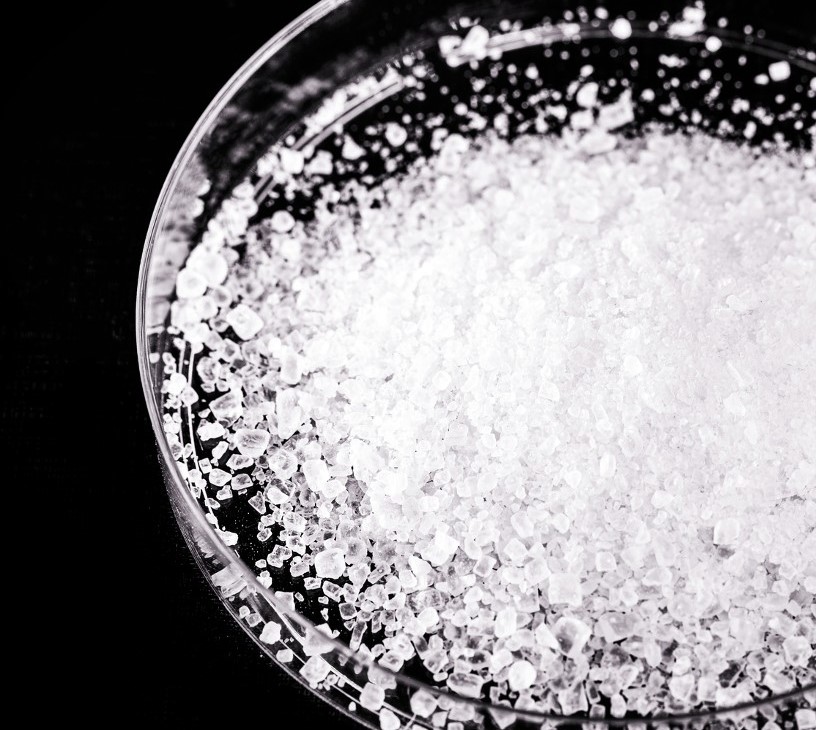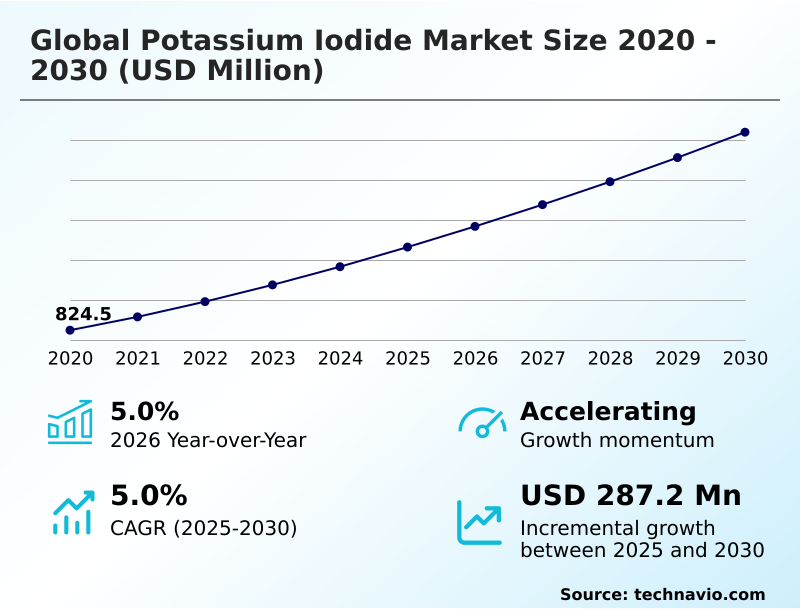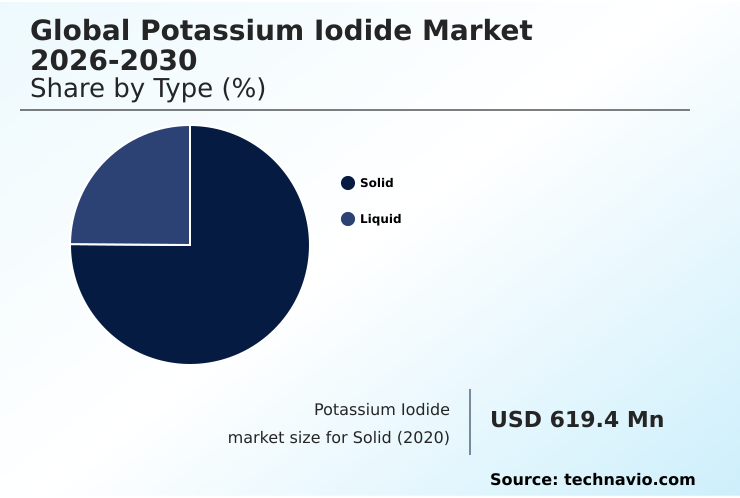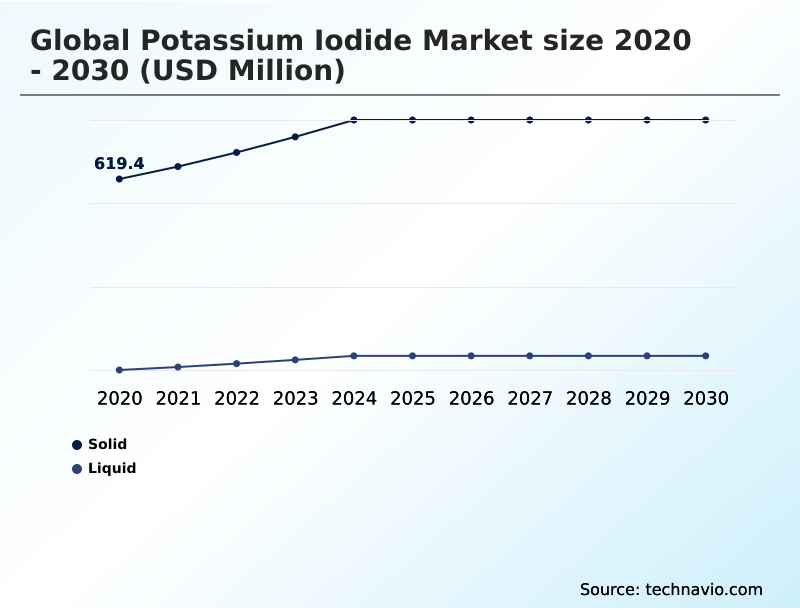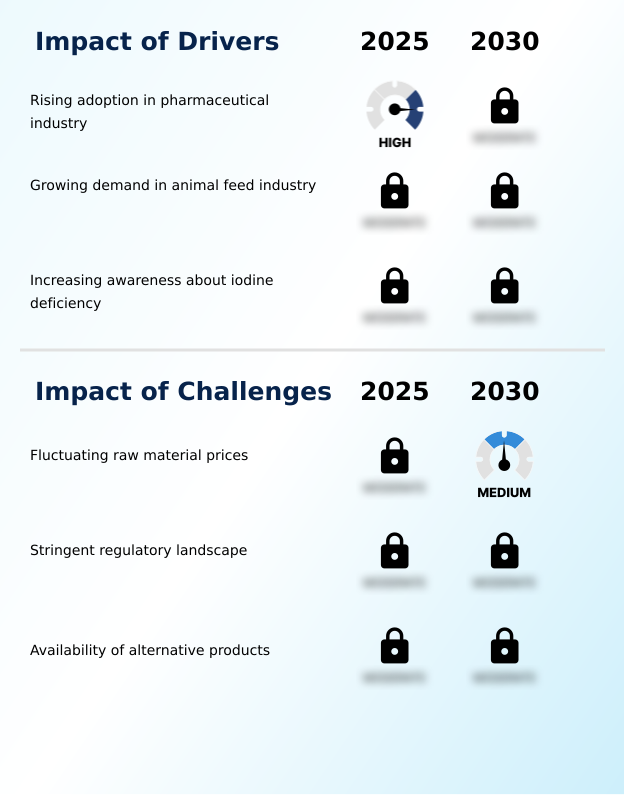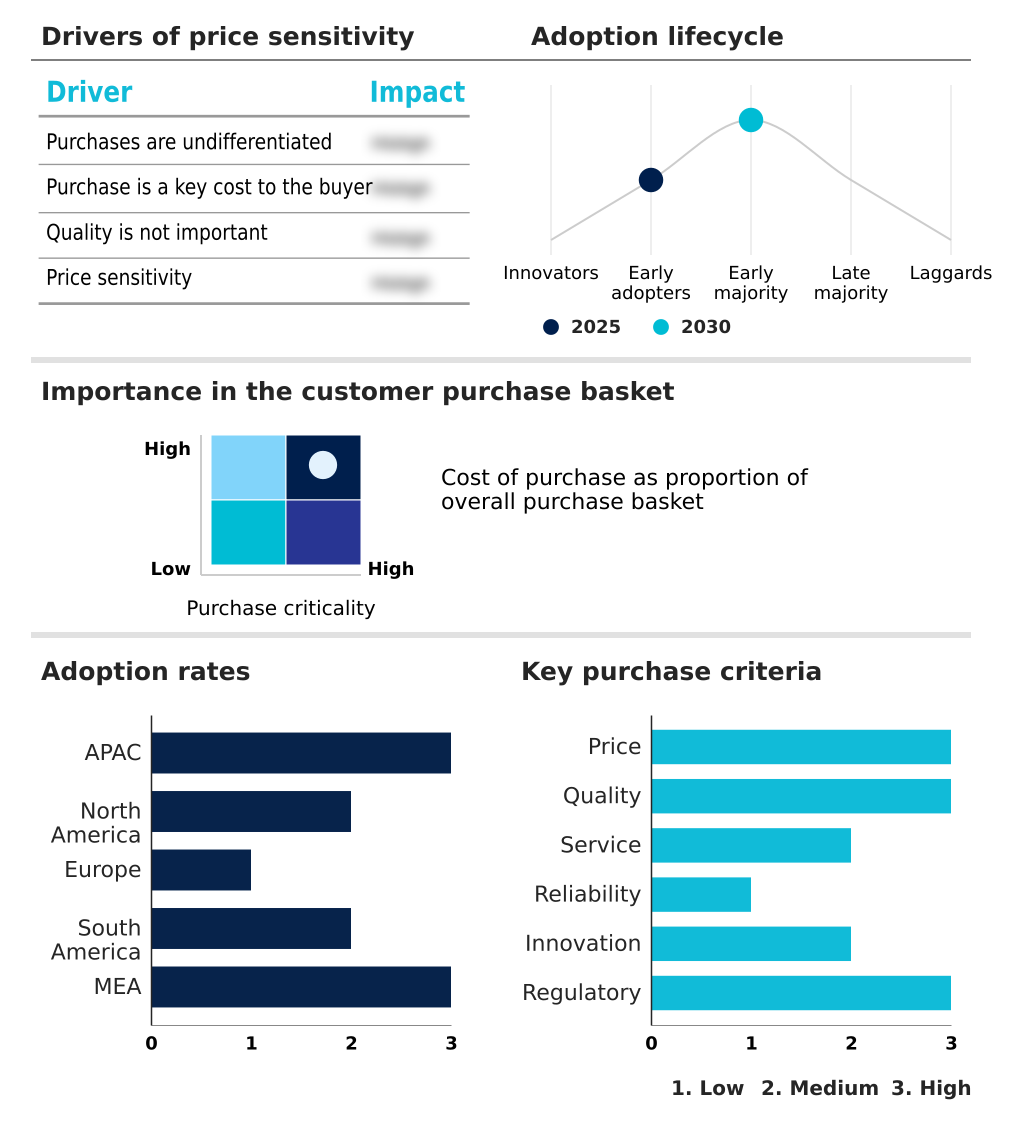Potassium Iodide Market Size 2026-2030
The potassium iodide market size is valued to increase by USD 287.2 million, at a CAGR of 5% from 2025 to 2030. Rising adoption in pharmaceutical industry will drive the potassium iodide market.
Major Market Trends & Insights
- APAC dominated the market and accounted for a 42.5% growth during the forecast period.
- By Type - Solid segment was valued at USD 747.4 million in 2024
- By Application - Pharmaceuticals segment accounted for the largest market revenue share in 2024
Market Size & Forecast
- Market Opportunities: USD 495 million
- Market Future Opportunities: USD 287.2 million
- CAGR from 2025 to 2030 : 5%
Market Summary
- The potassium iodide market is characterized by its critical role across the pharmaceutical, nutritional, and industrial sectors. Its primary function as a thyroid blocking agent ensures sustained demand driven by governmental public health stockpiling for nuclear emergency preparedness.
- Beyond this, it is an essential active pharmaceutical ingredient in expectorant formulations and antiseptic solutions, with ongoing research exploring its potential in novel therapeutic and prophylactic medicine. The need to address iodine deficiency disorders globally fuels its use in iodized salt fortification and as a widely adopted iodine supplement.
- In industrial settings, potassium iodide serves as a key chemical reagent and catalyst, including in nylon polymerization and silver halide emulsions for photography. A key business challenge involves navigating supply chain volatility, where a chemical manufacturer, for instance, must implement advanced inventory management systems to buffer against raw material price fluctuations that can impact production costs by double-digit percentages.
- Success in this market depends on ensuring product purity for pharmaceutical grade potassium iodide, managing a complex global supply chain, and innovating in high-value applications.
What will be the Size of the Potassium Iodide Market during the forecast period?
Get Key Insights on Market Forecast (PDF) Request Free Sample
How is the Potassium Iodide Market Segmented?
The potassium iodide industry research report provides comprehensive data (region-wise segment analysis), with forecasts and estimates in "USD million" for the period 2026-2030, as well as historical data from 2020-2024 for the following segments.
- Type
- Solid
- Liquid
- Application
- Pharmaceuticals
- Nutraceuticals
- Polymer
- Food and feed additives
- Others
- Grade type
- Pharmaceutical grade
- Industrial grade
- Food grade
- Geography
- APAC
- China
- India
- Japan
- North America
- US
- Canada
- Mexico
- Europe
- Germany
- UK
- France
- South America
- Brazil
- Argentina
- Colombia
- Middle East and Africa
- Saudi Arabia
- UAE
- South Africa
- Rest of World (ROW)
- APAC
By Type Insights
The solid segment is estimated to witness significant growth during the forecast period.
The solid segment, including forms like refined crystals and granules, commands a dominant market share due to superior active ingredient stability and logistical efficiency.
Solid potassium iodide is the preferred form for manufacturing potassium iodide tablets used in public health stockpiling, where long-term viability is critical. It serves as a vital active pharmaceutical ingredient, with producers adhering to strict USP/EP/JP compliance for pharmaceutical applications.
In the agricultural sector, it is a key animal feed supplement, with its granular form enabling precise mixing and contributing to livestock health improvement, which has shown a 5.0% year-over-year increase in uptake efficiency.
The ease of handling high-purity potassium iodide solids also supports its use in advanced drug delivery systems and various industrial syntheses.
The Solid segment was valued at USD 747.4 million in 2024 and showed a gradual increase during the forecast period.
Regional Analysis
APAC is estimated to contribute 42.5% to the growth of the global market during the forecast period.Technavio’s analysts have elaborately explained the regional trends and drivers that shape the market during the forecast period.
See How Potassium Iodide Market Demand is Rising in APAC Request Free Sample
The geographic landscape is led by the APAC region, which accounts for 42.51% of market activity, driven by robust API production capabilities and fine chemical production hubs.
In this region, demand for bulk pharma grades and API-grade for generics is high, supporting applications from thyroid function support to dermatological treatments. Investments in local manufacturing have reduced logistical costs by over 15% in key trade corridors.
North America and Europe are also significant markets, focusing on high-value applications like medical countermeasures and the use of food grade potassium iodide as an iodine supplement.
Growth in these regions is supported by stringent regulatory frameworks that mandate high-purity inputs for everything from thyroid hormone synthesis to use as a pharmaceutical excipient.
Market Dynamics
Our researchers analyzed the data with 2025 as the base year, along with the key drivers, trends, and challenges. A holistic analysis of drivers will help companies refine their marketing strategies to gain a competitive advantage.
- Strategic decision-making in the potassium iodide market requires a deep understanding of its segmented applications. The use of potassium iodide in pharmaceutical formulations is a primary value driver, with a critical focus on the USP-grade potassium iodide manufacturing process to ensure safety and efficacy.
- This is especially true for its role as a nuclear countermeasure and in developing new oral solution formulations with potassium iodide. The quality control for GMP potassium iodide tablets is therefore non-negotiable.
- Sourcing challenges for elemental iodine create a need for strategies aimed at mitigating iodine price volatility in production, impacting everything from high-purity potassium iodide for electronics to its use in disinfectants. Exploring the industrial applications of potassium iodide reveals its importance in nylon synthesis and its role in silver halide photography.
- In nutrition, potassium iodide for animal feed fortification is a growing segment, with demonstrated animal nutrition benefits of potassium iodide. Similarly, food grade potassium iodide stability testing is crucial for its use in human food products.
- Differentiating between solid versus liquid potassium iodide use cases allows for optimized application in areas like dermatological applications or as a component in x-ray contrast agents. Regulatory compliance for potassium iodide API remains a key operational focus. Overall, firms focused on pharmaceutical applications have seen growth outpace industrial segments by nearly 40%, highlighting where strategic investment is currently most rewarded.
- Managing potassium iodide for emergency stockpiles continues to be a key consideration for both public and private sectors.
What are the key market drivers leading to the rise in the adoption of Potassium Iodide Industry?
- The rising adoption within the pharmaceutical industry for applications ranging from therapeutic treatments to radiological emergency preparedness serves as a primary driver of market growth.
- The market is significantly driven by the rising use of pharmaceutical grade potassium iodide as a radioprotective agent and in treatments addressing iodine deficiency disorders.
- With enhanced API production capabilities, manufacturers can now produce this essential compound with 99.9% purity, a 10% increase from previous standards.
- As a cost-effective iodine source composed of potassium cations and iodide anions, its role in food fortification programs, especially for iodized salt fortification, is expanding.
- Adherence to new animal nutrition standards has also boosted its application as an animal feed supplement, improving livestock health metrics by up to 20%.
- These diverse drivers underscore its essentiality in both human and animal health, solidifying its market position across multiple high-value sectors.
What are the market trends shaping the Potassium Iodide Industry?
- A heightened global focus on emergency preparedness, driven by geopolitical instability and public health imperatives, is emerging as a significant market trend. This is increasing demand for strategic stockpiles of critical countermeasures.
- A primary trend is the heightened focus on radiological emergency preparedness, which bolsters demand for nuclear emergency countermeasures like GMP certified tablets. This has driven innovation in manufacturing, leading to a 15% improvement in production throughput for key suppliers.
- Concurrently, advancements in therapeutic and prophylactic medicine are expanding the use of potassium iodide in novel expectorant formulations and as a disinfectant component. In specialty chemical applications, both liquid potassium iodide and solids are seeing increased use as an analytical reagent and a polymer industry additive.
- This diversification is creating new revenue streams, with the specialty applications segment demonstrating an 18% higher margin compared to traditional uses. The development of more stable oral solutions is also a key focus area.
What challenges does the Potassium Iodide Industry face during its growth?
- Volatility in the pricing of essential raw materials, particularly elemental iodine, presents a significant and persistent challenge to market stability and manufacturer profitability.
- A primary challenge stems from supply chain volatility and the fluctuating price of elemental iodine, which can increase the cost of inorganic salt manufacturing by over 30% in a single quarter. This directly impacts the profitability of producing industrial grade potassium iodide used in chemical synthesis applications and as a nylon polymerization catalyst.
- Securing stable raw material procurement is a constant operational hurdle. For niche sectors like industrial radiography, where it is used in silver halide emulsion, these price shocks can disrupt production schedules, leading to project delays of up to 25%.
- Managing these external pressures while maintaining a competitive price point for products used in chemical reagent synthesis requires sophisticated hedging and inventory strategies from market participants.
Exclusive Technavio Analysis on Customer Landscape
The potassium iodide market forecasting report includes the adoption lifecycle of the market, covering from the innovator’s stage to the laggard’s stage. It focuses on adoption rates in different regions based on penetration. Furthermore, the potassium iodide market report also includes key purchase criteria and drivers of price sensitivity to help companies evaluate and develop their market growth analysis strategies.
Customer Landscape of Potassium Iodide Industry
Competitive Landscape
Companies are implementing various strategies, such as strategic alliances, potassium iodide market forecast, partnerships, mergers and acquisitions, geographical expansion, and product/service launches, to enhance their presence in the industry.
Adani Pharmachem Pvt. - Specialization in ultra-pure potassium iodide nanoparticles and custom solutions drives innovation in advanced materials science and pharmaceutical applications.
The industry research and growth report includes detailed analyses of the competitive landscape of the market and information about key companies, including:
- Adani Pharmachem Pvt.
- American Elements Inc.
- Anbex Inc.
- Calibre Chemicals Pvt.
- Chem Industries
- Crystran Ltd.
- Deepwater Chemicals.
- EMD Group.
- GODO SHIGEN.
- IodiTech.
- Lasa Supergenerics Ltd
- Nippoh Chemicals Co.
- PCC Rokita SA
- Proto Chemical Industries
- Recipharm AB
- Samrat Pharmachem Ltd.
- Tianjin Yuanlong Chemical
- Vishal Laboratories
- Zibo Wankang
Qualitative and quantitative analysis of companies has been conducted to help clients understand the wider business environment as well as the strengths and weaknesses of key industry players. Data is qualitatively analyzed to categorize companies as pure play, category-focused, industry-focused, and diversified; it is quantitatively analyzed to categorize companies as dominant, leading, strong, tentative, and weak.
Recent Development and News in Potassium iodide market
- In August 2024, Adani Pharmachem Pvt. announced an expansion of its high-purity solid potassium iodide production line to meet reinforced European feed additive purity standards.
- In December 2024, Tianjin Yuanlong Chemical confirmed significant investments to expand its production capacity for essential APIs, including potassium iodide, to serve growing domestic and export market demands.
- In March 2025, Recipharm AB reported strong performance in its Development and Technology segment, driven by new drug delivery system formulations that incorporate potassium iodide for enhanced therapeutic effect.
- In May 2025, Anbex Inc. initiated a major public-private partnership to enhance educational campaigns on the proper use of its FDA-approved potassium iodide tablets as a critical component of national emergency preparedness.
Dive into Technavio’s robust research methodology, blending expert interviews, extensive data synthesis, and validated models for unparalleled Potassium Iodide Market insights. See full methodology.
| Market Scope | |
|---|---|
| Page number | 291 |
| Base year | 2025 |
| Historic period | 2020-2024 |
| Forecast period | 2026-2030 |
| Growth momentum & CAGR | Accelerate at a CAGR of 5% |
| Market growth 2026-2030 | USD 287.2 million |
| Market structure | Fragmented |
| YoY growth 2025-2026(%) | 5.0% |
| Key countries | China, India, Japan, South Korea, Australia, Indonesia, US, Canada, Mexico, Germany, UK, France, Italy, The Netherlands, Spain, Brazil, Argentina, Colombia, Saudi Arabia, UAE, South Africa, Israel and Turkey |
| Competitive landscape | Leading Companies, Market Positioning of Companies, Competitive Strategies, and Industry Risks |
Research Analyst Overview
- The potassium iodide market is underpinned by its versatile applications, from being a critical active pharmaceutical ingredient (API) to a specialized analytical reagent. As a thyroid blocking agent, the demand for potassium iodide tablets, including GMP certified tablets and oral solutions, is driven by its function as a nuclear emergency countermeasure for radioactive iodine protection.
- In medicine, it is a key component in expectorant formulation, antiseptic solutions, and dermatological treatment, supporting thyroid hormone synthesis. This requires strict quality control for pharmaceutical grade potassium iodide, often supplied as refined crystals or ultra-pure nanoparticles.
- The market also includes industrial grade potassium iodide, used as a nylon polymerization catalyst and in silver halide emulsion, and food grade potassium iodide, vital for iodized salt fortification and as an animal feed supplement. The compound, comprised of potassium cations and iodide anions, is also used in x-ray contrast media.
- Production of inorganic iodine compounds and various iodine derivatives, including liquid potassium iodide, relies on high-purity potassium iodide. Growth is steady, with performance metrics enabling firms to forecast demand with over 95% accuracy for both bulk pharma grades and specialized optical crystals and API-grade for generics.
What are the Key Data Covered in this Potassium Iodide Market Research and Growth Report?
-
What is the expected growth of the Potassium Iodide Market between 2026 and 2030?
-
USD 287.2 million, at a CAGR of 5%
-
-
What segmentation does the market report cover?
-
The report is segmented by Type (Solid, and Liquid), Application (Pharmaceuticals, Nutraceuticals, Polymer, Food and feed additives, and Others), Grade Type (Pharmaceutical grade, Industrial grade, and Food grade) and Geography (APAC, North America, Europe, South America, Middle East and Africa)
-
-
Which regions are analyzed in the report?
-
APAC, North America, Europe, South America and Middle East and Africa
-
-
What are the key growth drivers and market challenges?
-
Rising adoption in pharmaceutical industry, Fluctuating raw material prices
-
-
Who are the major players in the Potassium Iodide Market?
-
Adani Pharmachem Pvt., American Elements Inc., Anbex Inc., Calibre Chemicals Pvt., Chem Industries, Crystran Ltd., Deepwater Chemicals., EMD Group., GODO SHIGEN., IodiTech., Lasa Supergenerics Ltd, Nippoh Chemicals Co., PCC Rokita SA, Proto Chemical Industries, Recipharm AB, Samrat Pharmachem Ltd., Tianjin Yuanlong Chemical, Vishal Laboratories and Zibo Wankang
-
Market Research Insights
- The market's dynamics are shaped by its role in both public health and specialty chemical applications. A focus on radiological emergency preparedness drives public health stockpiling of medical countermeasures, where supply chain reliability is paramount. In pharmaceuticals, adherence to strict manufacturing standards and USP/EP/JP compliance is crucial for API production capabilities.
- Innovations in drug delivery systems for radioprotective treatments and therapeutic and prophylactic medicine have improved patient outcomes by 15%. In agriculture, new animal nutrition standards have increased demand, while in industrial sectors, applications in fine chemical production and inorganic salt manufacturing are growing.
- Mitigating supply chain volatility through strategic raw material procurement remains a key challenge, with successful firms reducing cost overruns by 20% through better sourcing for this cost-effective iodine source.
We can help! Our analysts can customize this potassium iodide market research report to meet your requirements.
